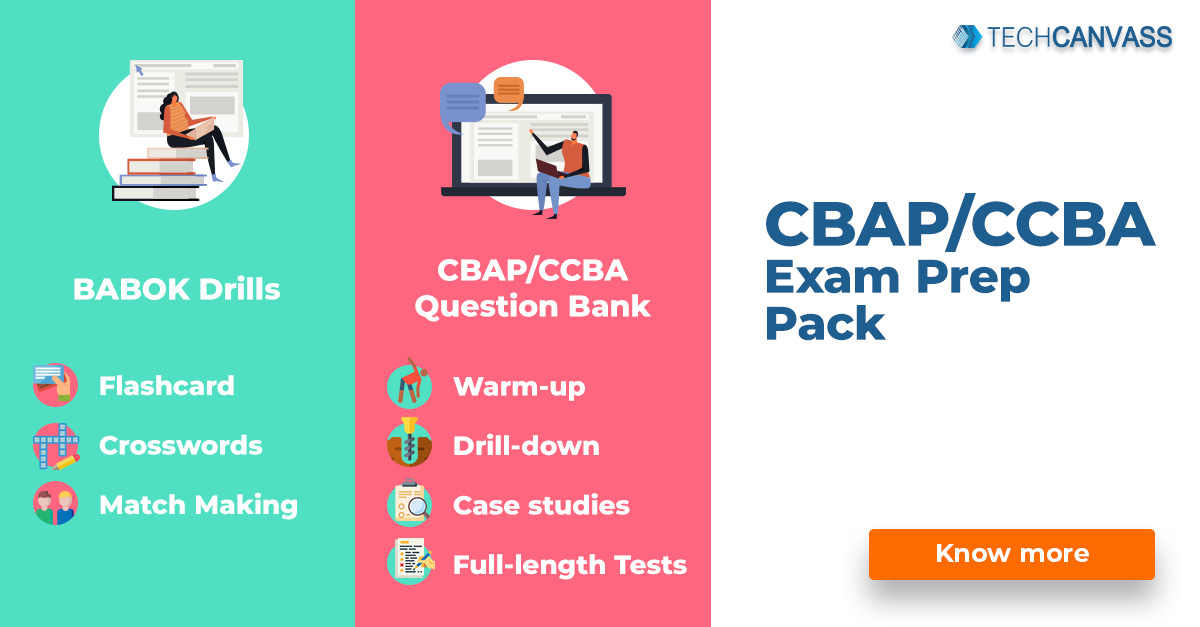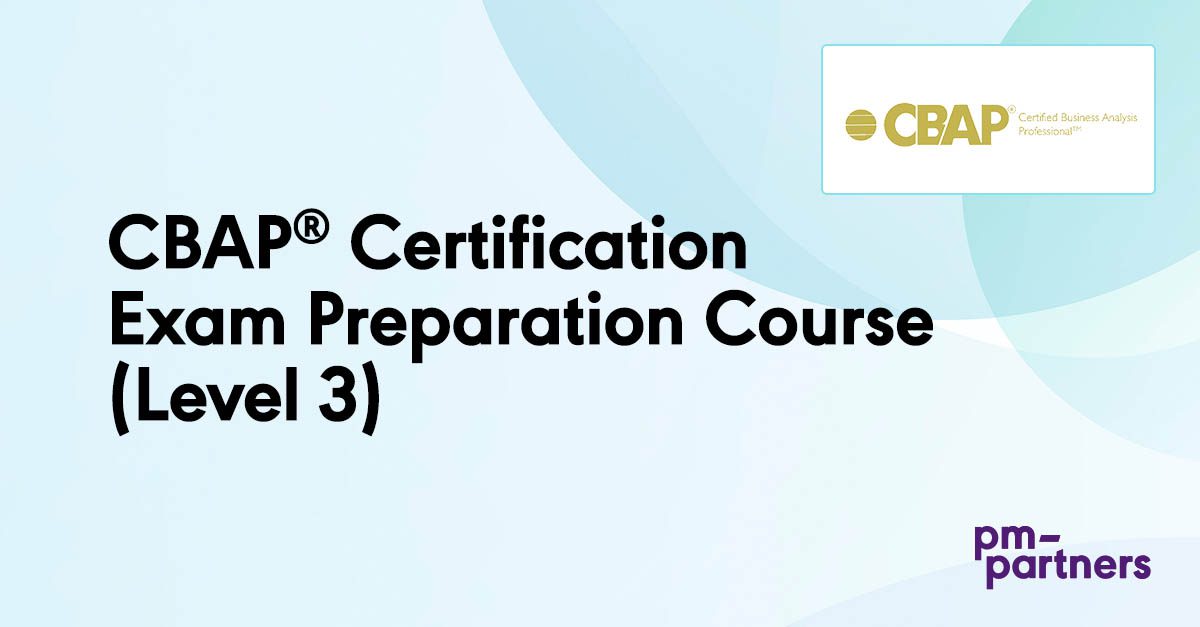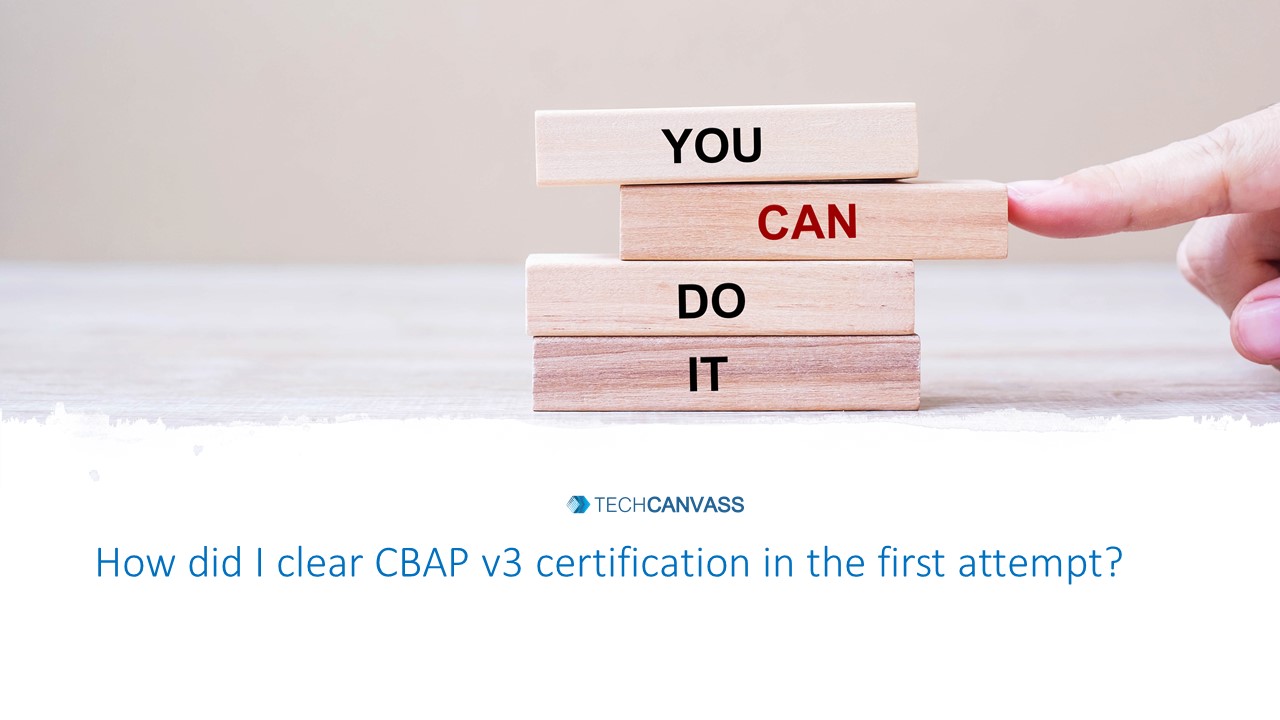CBAP Exam preparation – Embark on a journey to conquer the CBAP exam with confidence. This comprehensive guide will empower you with the knowledge and strategies to excel in each aspect of the exam, unlocking your potential as a certified business analysis professional.
As you delve into the intricacies of the CBAP exam, you will gain a deep understanding of its structure, content, and testing patterns. We will explore effective study techniques, resource recommendations, and case study analysis approaches to maximize your preparation.
Exam Overview

The CBAP exam is a rigorous assessment that evaluates your knowledge and skills in business analysis. It’s designed to ensure that you have the necessary expertise to effectively manage and execute business analysis initiatives.
The exam consists of 150 multiple-choice questions that must be completed within 3 hours and 15 minutes. The questions cover a wide range of topics, including:
- Business Analysis Planning and Monitoring
- Elicitation and Collaboration
- Requirements Analysis and Definition
- Solution Assessment and Validation
- Stakeholder Management and Communication
To pass the exam, you need to score a minimum of 70%. The exam is challenging, but with proper preparation, you can increase your chances of success.
Study Plan Development

Crafting a tailored study plan is the key to CBAP exam success. But let’s face it, it’s not a one-size-fits-all situation. You need a plan that works for you, your schedule, and your learning style.
Here’s how to build a study plan that’s as unique as you are:
1. Know Thyself
Start by understanding your strengths, weaknesses, and how you learn best. Are you a morning person or a night owl? Do you prefer reading textbooks or watching videos? Once you know your learning style, you can tailor your study plan to match.
2. Time Management Masterclass
Time management is crucial for CBAP exam prep. Create a realistic study schedule that fits into your daily routine. Break down large tasks into smaller, manageable chunks and set achievable goals for each study session.
3. Balancing Act
Balancing study with other commitments can be a juggling act. Prioritize your tasks, delegate when possible, and don’t be afraid to ask for help from friends, family, or colleagues.
4. The Power of Pomodoro
Try the Pomodoro Technique: work for 25 minutes, then take a 5-minute break. This helps maintain focus and prevents burnout.
5. Mock Exams and Feedback
Practice makes perfect! Take mock exams regularly to assess your progress and identify areas that need improvement. Seek feedback from experienced professionals or mentors to gain valuable insights.
Resource Identification
Identifying the right resources is crucial for your CBAP exam preparation journey. Let’s dive into the treasure trove of study materials and explore the best ways to choose what suits you best.
To evaluate resources effectively, consider your learning style, strengths, and weaknesses. Books offer a comprehensive foundation, while online courses provide interactive experiences. Practice exams test your understanding and identify areas for improvement.
Recommended Study Materials
| Resource | Key Features | Strengths | Weaknesses |
|---|---|---|---|
| CBAP Exam Prep Guide (PMI) | – Official PMI publication – Covers all exam domains |
– Authoritative and up-to-date – Aligns with exam blueprint |
– Expensive – Can be dry and technical |
| CBAP Study Guide (IIBA) | – Comprehensive and detailed – Includes practice questions |
– Covers a wide range of topics – Well-written and easy to understand |
– Can be overwhelming for some – May not align perfectly with exam blueprint |
| Udemy: CBAP Exam Prep Course | – Online video course – Interactive and engaging |
– Provides real-world examples – Offers flexible learning options |
– May not cover all exam topics in depth – Requires self-discipline |
| Simplilearn: CBAP Exam Preparation Course | – Online training program – Includes practice exams |
– Structured and well-organized – Provides support from instructors |
– Expensive – Limited flexibility |
| PMI Practice Exams | – Official PMI practice exams – Simulates actual exam experience |
– Accurate and reliable – Helps identify knowledge gaps |
– Limited number of questions – May not cover all exam topics |
Free or Low-Cost Resources
- CBAP Exam Artikel (PMI): Provides the exam blueprint and domain weights.
- IIBA Knowledge Hub: Articles, webinars, and resources on business analysis topics.
- CBAP Study Groups: Join online or local groups for collaboration and support.
- YouTube Videos: Search for free tutorials and exam prep videos.
Writing Study Notes
Effective note-taking helps retain information and improve recall. Use a method that suits you, such as Cornell Notes or mind mapping. Highlight key concepts, draw diagrams, and add your own insights. Regularly review your notes to reinforce learning.
Technology in Resource Identification
Technology can enhance your resource identification process. Use search engines, online libraries, and review platforms to find relevant materials. Utilize social media to connect with other candidates and share study tips. Consider using note-taking apps or digital flashcards for efficient study.
– Explain the five knowledge areas of the CBAP exam
The CBAP exam is a challenging test that requires a deep understanding of business analysis concepts. The exam is divided into five knowledge areas: Business Analysis Planning and Monitoring, Elicitation and Collaboration, Requirements Life Cycle Management, Strategy Analysis, and Solution Evaluation. Each knowledge area covers a specific aspect of business analysis, and it is important to have a strong understanding of all five areas in order to pass the exam.
In this article, we will provide an overview of each knowledge area, including the key concepts that you need to know. We will also provide some strategies for understanding and retaining these concepts.
Business Analysis Planning and Monitoring
The Business Analysis Planning and Monitoring knowledge area covers the activities involved in planning and managing business analysis activities. This includes defining the scope of business analysis activities, developing and managing the business analysis plan, and monitoring and controlling the business analysis process.
- Key Concepts:
- Scope of business analysis activities
- Business analysis plan
- Monitoring and controlling the business analysis process
Elicitation and Collaboration
The Elicitation and Collaboration knowledge area covers the activities involved in identifying and engaging stakeholders, eliciting and documenting requirements, and facilitating collaboration among stakeholders.
To ace the CBAP Exam, you need to have a solid understanding of business analysis concepts and techniques. One key area is use cases. Understanding how to develop and use use cases is crucial for gathering and documenting requirements. For a deeper dive into this topic, check out Business Analyst – Use Case . It provides valuable insights and examples that will enhance your CBAP Exam preparation.
- Key Concepts:
- Stakeholder identification and engagement
- Requirements elicitation and documentation
- Facilitation of stakeholder collaboration
Requirements Life Cycle Management
The Requirements Life Cycle Management knowledge area covers the activities involved in managing requirements throughout the project lifecycle. This includes ensuring that requirements are complete, consistent, and traceable.
- Key Concepts:
- Requirements management throughout the project lifecycle
- Completeness, consistency, and traceability of requirements
Strategy Analysis
The Strategy Analysis knowledge area covers the activities involved in analyzing business and IT strategies, identifying opportunities for improvement, and developing and evaluating solution options.
CBAP Exam preparation is like a marathon, requiring both endurance and focus. It’s crucial to cover all the bases, including the User Acceptance Test – UAT, which plays a vital role in ensuring that the software meets the users’ requirements.
Understanding UAT, as explained in this comprehensive guide User Acceptance Test – UAT , will strengthen your understanding of the CBAP curriculum and enhance your chances of exam success.
- Key Concepts:
- Analysis of business and IT strategies
- Identification of opportunities for improvement
- Development and evaluation of solution options
Solution Evaluation
The Solution Evaluation knowledge area covers the activities involved in evaluating solution options and recommending a solution that meets the business needs.
- Key Concepts:
- Evaluation of solution options
- Recommendation of a solution that meets the business needs
Case Study Analysis

:
CBAP case studies are a crucial part of the exam, testing your ability to analyze real-world business scenarios and develop effective solutions. Let’s dive into how to approach and ace these case studies like a pro!
5.1. Case Study Approach
Understanding the case study is key. Read it thoroughly, identify the problem, and gather all relevant information. Don’t forget to consider the industry context and organizational culture, as they can shape the solution.
5.2. Key Issue Identification
Pinpoint the core business problem. Use root cause analysis to dig deeper into the underlying issues. Categorize them based on impact and urgency to prioritize your efforts.
5.3. Stakeholder Analysis
Stakeholders can make or break your solution. Identify them, assess their needs and influence, and develop a plan to engage and manage them throughout the process.
5.4. Requirements Gathering
Elicit and document requirements from stakeholders and case study materials. Prioritize them based on criticality and feasibility to ensure your solution meets the most important needs.
5.5. Solution Development
Brainstorm and evaluate potential solutions. Use decision-making frameworks to select the best option. Develop a detailed plan with implementation strategies, timelines, and resources.
5.6. Recommendation Development
Your recommendations should be clear, actionable, and aligned with business objectives and stakeholder needs. Present them in a compelling manner, supported by evidence from the case study analysis.
Exam Preparation Strategies

As you gear up for the CBAP exam, it’s crucial to arm yourself with effective study techniques that will maximize your knowledge retention and increase your chances of success. Let’s dive into some proven strategies to help you ace this challenging exam.
One key principle to embrace is active learning, which involves engaging with the material in a way that goes beyond passive reading. This could mean creating flashcards, summarizing chapters, or teaching the concepts to someone else. By actively processing the information, you’re more likely to retain it in your long-term memory.
Spaced Repetition
Another effective technique is spaced repetition. Instead of cramming everything in at once, break down your study sessions into smaller chunks and review the material at increasing intervals. This helps strengthen the neural pathways in your brain, making the information more readily accessible when you need it.
Self-Testing
Self-testing is an invaluable tool for assessing your understanding and identifying areas where you need more focus. Take practice exams, quizzes, or flashcards regularly to gauge your progress and pinpoint any knowledge gaps. This feedback loop will help you fine-tune your preparation and ensure you’re on track.
The CBAP Exam is a challenging but rewarding certification for IT professionals. To prepare for the exam, it’s essential to have a solid understanding of the IT business analyst role and its responsibilities. This is where the Overview of IT Business Analyst comes in.
This comprehensive guide provides a thorough introduction to the field, covering the different types of business analysts, their key skills, and the various methodologies they use. With a deep understanding of the IT business analyst role, you’ll be well-equipped to tackle the CBAP Exam and advance your career in this dynamic field.
Positive Study Environment
Finally, creating a positive and productive study environment is essential for success. Find a quiet space where you can focus without distractions. Make sure you have all the necessary materials, such as textbooks, notes, and practice exams, within easy reach. Take breaks when needed and reward yourself for your efforts to stay motivated throughout your preparation journey.
Time Management for Exam Preparation

Time management is crucial for effective CBAP exam preparation. It allows you to maximize your study time, prioritize tasks, and avoid procrastination.
Creating a Realistic Study Schedule
Craft a realistic study schedule that accommodates your other commitments. Allocate specific time slots for studying and stick to them. Break down large study sessions into smaller, manageable chunks to prevent burnout.
Prioritizing Tasks
Identify the most important concepts and allocate more study time to them. Use the CBAP exam blueprint to guide your prioritization. Focus on understanding key terms, concepts, and case studies.
Using a Timer
Track your study time using a timer. This helps you stay focused and avoid distractions. Use the Pomodoro Technique: study for 25 minutes, then take a 5-minute break. After four Pomodoros, take a longer break of 20-30 minutes.
Avoiding Procrastination, CBAP Exam preparation
Set small, achievable goals to avoid feeling overwhelmed. Reward yourself for completing tasks. Find a study buddy or join a study group for accountability and motivation.
Resources for Time Management
* [Trello](https://trello.com/)
* [Todoist](https://todoist.com/)
* [Pomodoro Timer](https://pomodorotechnique.com/timer/)
Exam Preparation Resources: CBAP Exam Preparation

The CBAP exam is a challenging but rewarding certification. To increase your chances of success, it’s crucial to utilize a variety of preparation resources. This includes online platforms, study groups, and forums dedicated to CBAP exam preparation.
For the CBAP exam, understanding the nitty-gritty of requirement gathering is crucial. Head over to Business Analyst – Requirement Gathering for a comprehensive guide on this topic. Once you’ve mastered this aspect, you’ll be well-equipped to tackle the CBAP exam and excel in your Business Analyst career.
Connecting with other professionals and sharing knowledge can significantly enhance your understanding of the exam material. By engaging in discussions, you can gain insights from experienced individuals, clarify concepts, and identify areas where you need further improvement.
Evaluating and Selecting Resources
When evaluating and selecting resources, consider the following factors:
- Relevance: Ensure the resources align with the CBAP exam syllabus and cover all the necessary knowledge areas.
- Quality: Look for resources created by reputable organizations or individuals with expertise in business analysis.
- Learning style: Choose resources that match your preferred learning style, whether it’s interactive simulations, video lectures, or written materials.
- Cost: Consider the cost of the resources and determine if they fit within your budget.
- Reviews: Read reviews from other candidates to gauge the effectiveness and user experience of the resources.
Resource Comparison Table
The following table compares different CBAP exam preparation resources based on their features, cost, and reviews:
| Resource | Features | Cost | Reviews |
|---|---|---|---|
| IIBA CBAP Exam Prep Course | Live online classes, mock exams, study materials | $1,499 | 4.5/5 |
| PMI CBAP Exam Prep Course | Online self-paced course, mock exams, access to experts | $1,299 | 4/5 |
| Simplilearn CBAP Exam Prep Course | Live online classes, recorded videos, practice questions | $999 | 4.2/5 |
| Udemy CBAP Exam Prep Course | Self-paced video lectures, practice questions, quizzes | $199 | 4/5 |
Personalized Study Plan
Once you have selected your resources, create a personalized study plan that works for you. Consider the following:
- Set realistic goals: Break down the study material into smaller chunks and set achievable daily or weekly goals.
- Allocate study time: Schedule specific time slots for studying and stick to them as much as possible.
- Use a variety of resources: Combine different types of resources to cater to your learning style and keep the study process engaging.
- Practice regularly: Take mock exams and practice questions to test your understanding and identify areas for improvement.
- Seek support: Join study groups or connect with mentors to get additional support and motivation.
Exam Content Breakdown
The CBAP exam is designed to assess your knowledge and skills in business analysis. The exam is divided into five knowledge areas, and each knowledge area is weighted differently in terms of the number of questions that will be asked about it. The following table provides a breakdown of the exam content by knowledge area:
| Knowledge Area | Percentage of Exam Questions |
|---|---|
| Business Analysis Planning and Monitoring | 22% |
| Elicitation and Collaboration | 25% |
| Requirements Analysis and Definition | 28% |
| Solution Assessment and Validation | 15% |
| Business Analysis Communication and Leadership | 10% |
In addition to the knowledge area breakdown, the exam questions are also distributed based on difficulty level. Approximately 60% of the questions will be at the “easy” or “moderate” difficulty level, while the remaining 40% will be at the “difficult” level. The difficult questions are typically more complex and require a deeper understanding of the material.
The types of questions that you can expect on the exam include multiple choice, true/false, and short answer. The multiple choice questions will typically have three or four answer choices, and you will need to select the best answer. The true/false questions will require you to indicate whether a statement is true or false. The short answer questions will require you to provide a brief written response.
Exam Question Analysis
Exam questions are meticulously crafted to assess your grasp of CBAP concepts. Analyzing sample questions provides invaluable insights into the key concepts tested and the testing patterns employed.
By dissecting each question, you can decipher the underlying intent and identify the specific knowledge areas being evaluated. This enables you to focus your preparation on the most critical areas.
Understanding Question Intent
- Read the question carefully, identifying the core concept being tested.
- Examine the question stem for s or phrases that indicate the intended focus.
- Consider the context of the question and how it relates to the CBAP knowledge areas.
Eliminating Incorrect Answer Choices
- Start by eliminating answer choices that are clearly incorrect or irrelevant.
- Identify choices that contradict established CBAP principles or best practices.
- Look for choices that contain logical fallacies or unsupported assumptions.
Selecting the Best Response
- Choose the answer choice that most accurately addresses the question’s intent.
- Select the response that is supported by the CBAP knowledge areas and industry standards.
- Consider the overall context of the question and the implications of each answer choice.
Exam Simulation Practice

Practicing with simulated exams is like a sneak peek into the real CBAP exam. It helps you familiarize yourself with the exam format, question types, and time constraints. It’s like a dress rehearsal for the big day, allowing you to identify areas where you need extra polish.
There are plenty of resources available online where you can find realistic mock exams. Some popular options include the IIBA’s Practice Exam Simulator and Exam Edge. These exams are designed to mimic the actual exam as closely as possible, providing you with a valuable opportunity to test your knowledge and identify areas for improvement.
Reviewing Simulated Exam Results
Once you’ve taken a mock exam, don’t just stash it away in a folder. Take the time to review your results thoroughly. Analyze which questions you got right and which ones you missed. This will help you pinpoint your strengths and weaknesses, so you can focus your remaining study time on the areas where you need the most improvement.
Writing an Essay on Exam Preparation Using Mock Exams
To effectively prepare for the CBAP exam using mock exams, follow these steps:
- Take multiple mock exams: The more mock exams you take, the better prepared you’ll be for the real thing. Aim to take at least 3-5 full-length exams.
- Review your results carefully: After each mock exam, take the time to review your answers and identify areas where you need improvement.
- Focus on your weak areas: Use the results of your mock exams to identify your weak areas and focus your remaining study time on those areas.
- Time yourself: When taking mock exams, be sure to time yourself to get a feel for the pace of the real exam.
- Simulate the exam environment: To get the most out of your mock exams, try to simulate the actual exam environment as much as possible. This means taking the exam in a quiet place, without distractions.
Final Conclusion

Remember, the CBAP exam is not merely a test but a gateway to enhance your professional credibility and demonstrate your mastery in business analysis. Embrace this challenge with determination, and let this guide be your trusted companion on the path to success.
Questions and Answers
What is the duration of the CBAP exam?
The CBAP exam is a 3.5-hour closed-book exam.
How many questions are on the CBAP exam?
There are 150 multiple-choice questions on the CBAP exam.
What is the passing score for the CBAP exam?
The passing score for the CBAP exam is 70%.
How can I prepare for the CBAP exam?
There are many ways to prepare for the CBAP exam, including studying the CBAP exam blueprint, taking a CBAP exam prep course, and practicing with mock exams.
